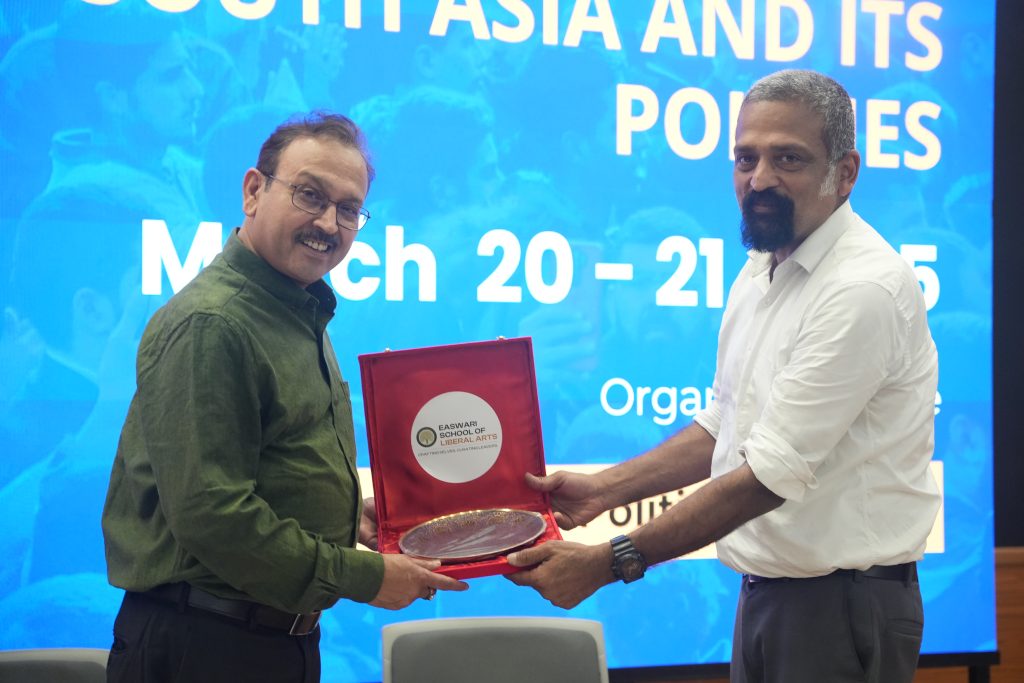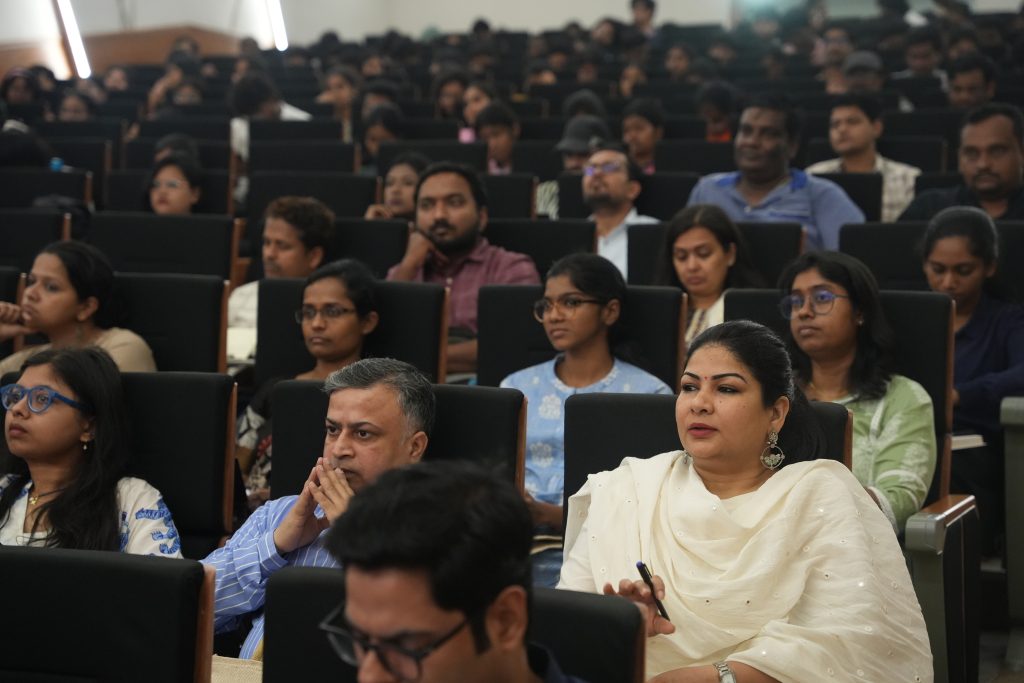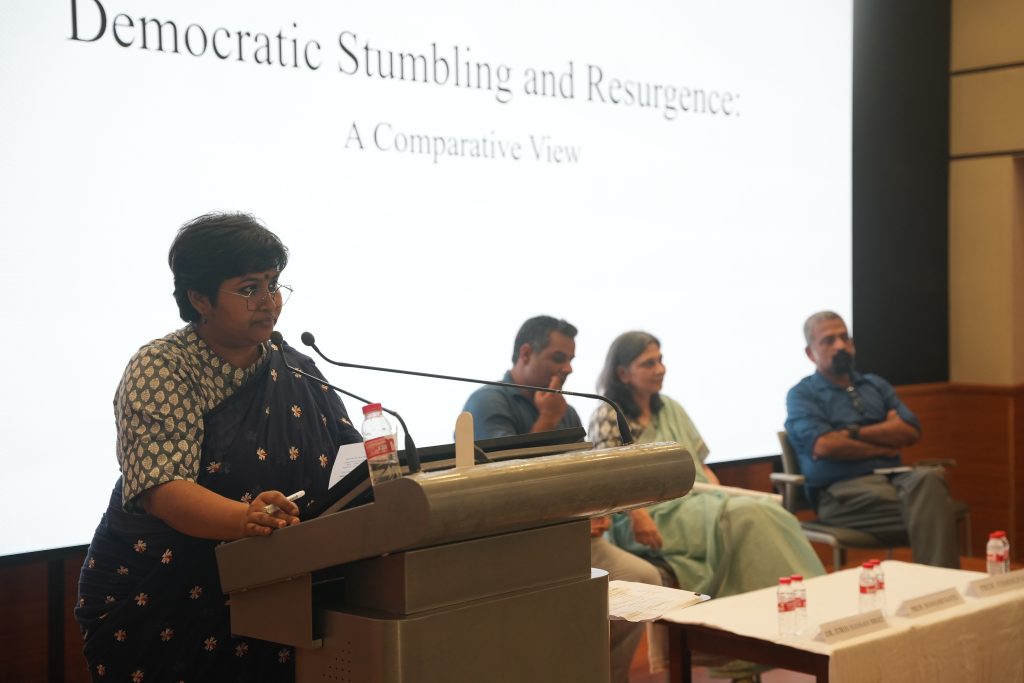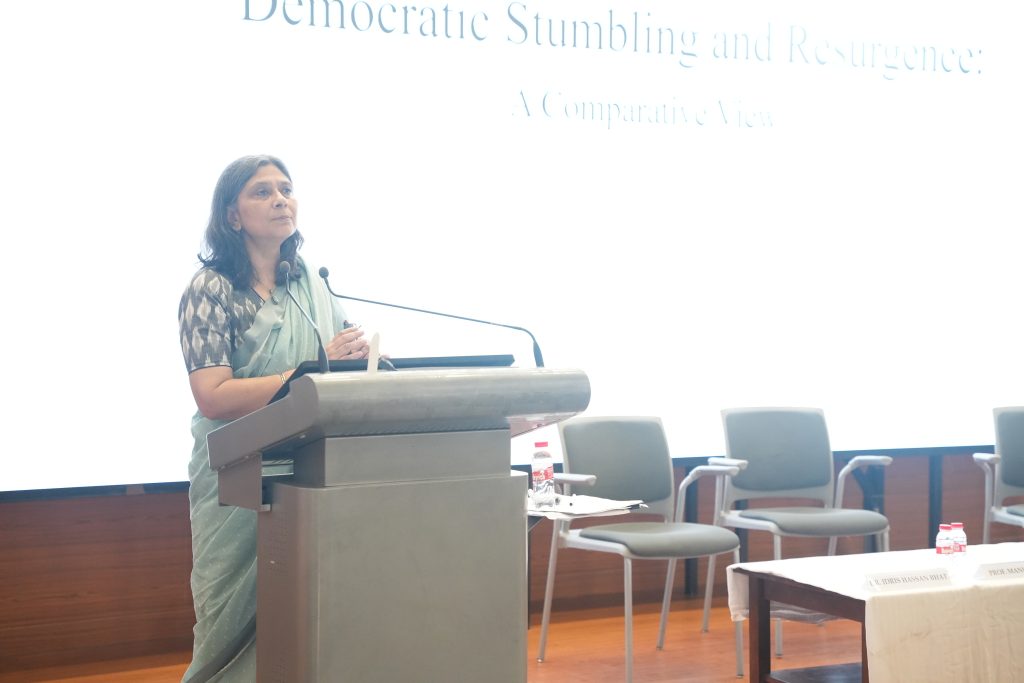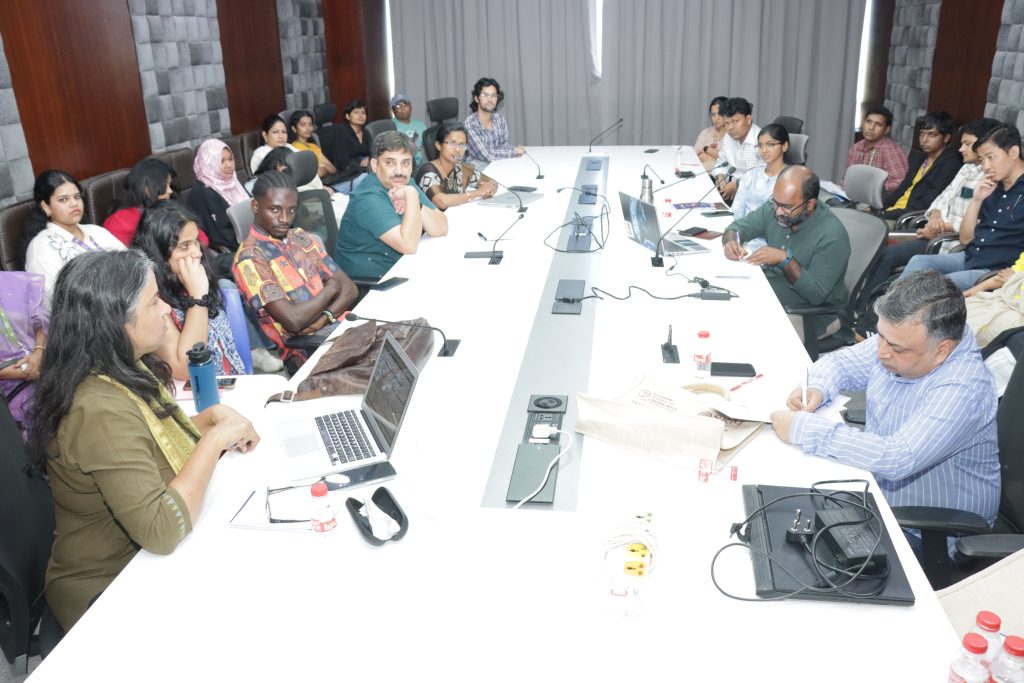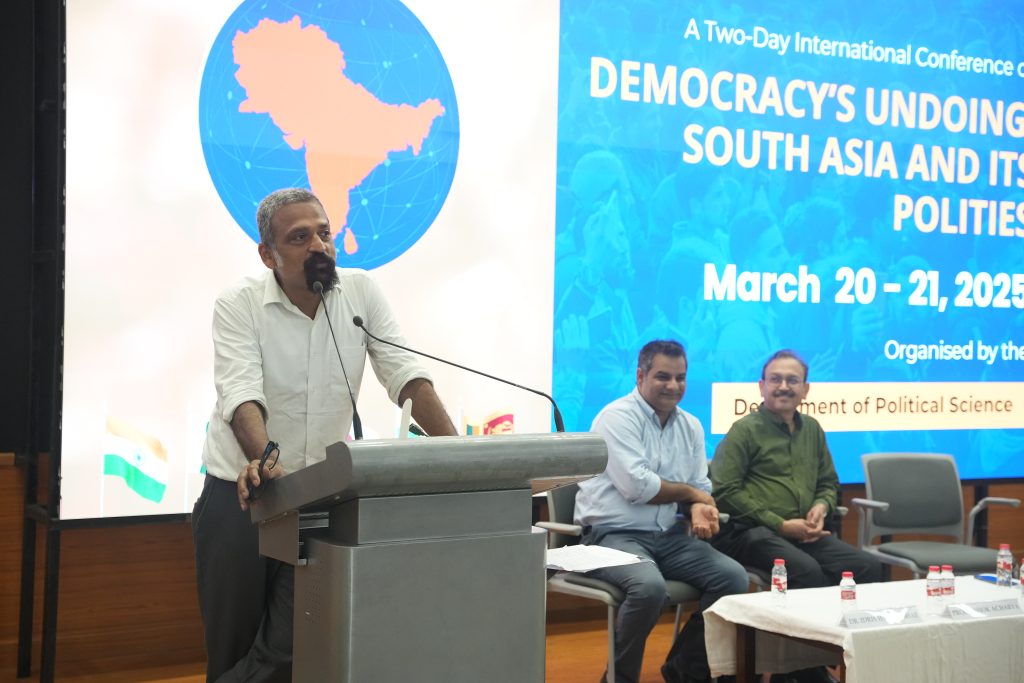“Democracy Unravelled” – International Conference on Exploring the South Asian Political Perspective
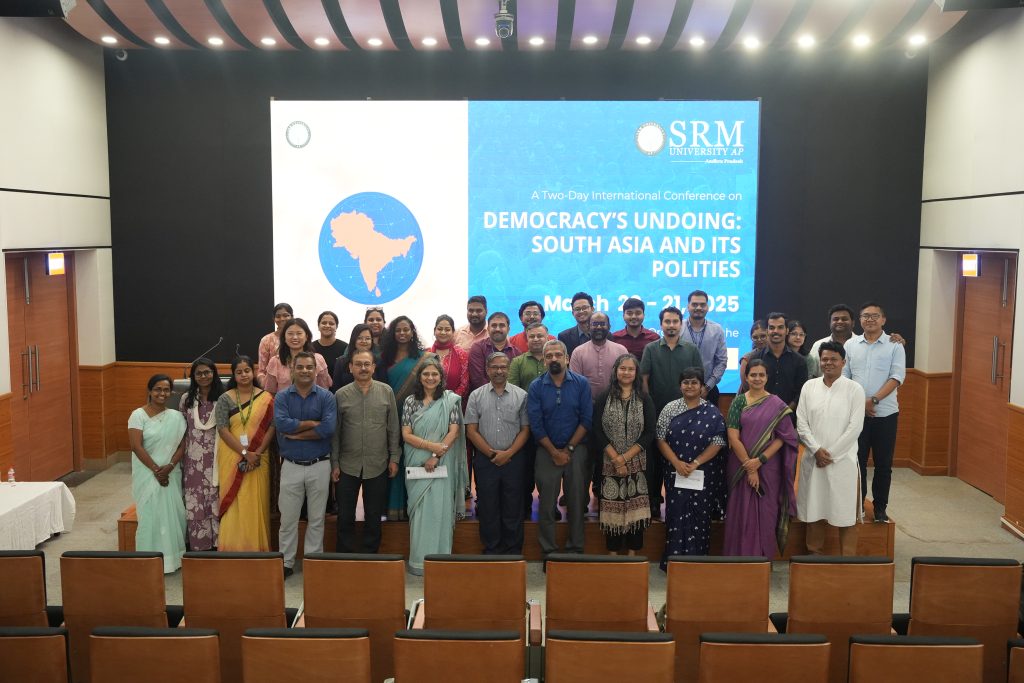
Academicians, research scholars, and social scientists from renowned institutions across the world assembled at the two-day international conference on “Democracy’s Undoing: South Asia and its Polities” hosted by SRM AP on March 20-21, 2025, to explore the pressing issues and challenges faced by various democracies in South Asia. The conference organised under the aegis of the Department of Political Science, Easwari School of Liberal Arts, explored the concept of democracy and its relevance to the current political landscape in South Asia.
Prof. Vishnupad, Dean – Easwari School of Liberal Arts set the tone for the conference in his welcome address. He deliberated on various aspects of democracy and shared the vision behind Easwari School of Liberal Arts, now home to seven vibrant departments, each oriented towards the holistic growth of its students— intellectual, emotional, and ethical. Dr Idris Hassan Bhat, Assistant Professor of the Department of Political Science and the convener of the conference, addressed the resilience of democratic ideals in South Asian nations.
Prof. Ashok Acharya, from the Department of Political Science, University of Delhi, delivered the first keynote session on the contextual explorations of liberalism. He examined liberal values and how they align with democracy in today’s complex political climate. Tracing the relationship between liberalism and democracy, Prof. Acharya stated, “The 20th century saw democracy take root as a regime, while liberalism functioned as a guiding ideology with an emphasis on liberty, self-governance, and diversity.” He elaborated on the significance of ‘dissensus’ in a liberal democratic society.
The second keynote address welcomed Dr Kurt Annen, a Professor of Economics at the University of Guelph, Ontario, Canada, who offered a global perspective on democracies. One of the central themes of the lecture was the challenge of establishing a clear causal relationship between democracy and economic growth. He also highlighted the importance of understanding the mechanisms through which democracies may foster economic development.
The conference also featured thought-provoking panel discussions, roundtable sessions, and paper presentations on various topics, ranging from Religious Nationalism and Homeland Fantasies in South Asia to the State of Minorities in South Asia to the Challenges of Inequality and Poverty to Democracy, that provided intense academic engagement and fresh perspectives for the participants and students at the Easwari School of Liberal Arts.
- Published in Departmental News, News, Political Science News, Research News
Dr Vineeth Thomas Analyses Challenges Ahead for Modi’s Third Term
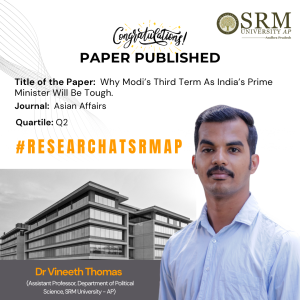 Dr Vineeth Thomas, an Assistant Professor in the Department of Political Science, has recently published a thought-provoking paper titled “Why Modi’s Third Term as India’s Prime Minister Will Be Tough” in the distinguished journal Asian Affairs. In his comprehensive analysis, Dr Vineeth delves into the political landscape of India and the various challenges Prime Minister Narendra Modi may face if he seeks re-election for a third consecutive term in 2024. Drawing on an array of political theories and current socio-economic indicators, the paper examines the underlying factors shaping Indian politics and public sentiment.
Dr Vineeth Thomas, an Assistant Professor in the Department of Political Science, has recently published a thought-provoking paper titled “Why Modi’s Third Term as India’s Prime Minister Will Be Tough” in the distinguished journal Asian Affairs. In his comprehensive analysis, Dr Vineeth delves into the political landscape of India and the various challenges Prime Minister Narendra Modi may face if he seeks re-election for a third consecutive term in 2024. Drawing on an array of political theories and current socio-economic indicators, the paper examines the underlying factors shaping Indian politics and public sentiment.
Dr Thomas argues that while Modi’s leadership has been marked by significant economic reforms and a robust foreign policy, the landscape is shifting in a manner that could complicate his re-election bid. Key issues explored in the paper include rising economic disparities, increasing urban unrest, and the challenge of maintaining communal harmony in a diversely populated nation.
The findings of this research are particularly pertinent in light of ongoing debates surrounding economic policy, agrarian distress, and the role of civil liberties – a backdrop that could significantly influence electoral dynamics heading into 2024.
The publication of this paper not only highlights Dr Thomas’s expertise in political science but also underscores the vital role academic discourse plays in contemporary political analysis. His insights contribute to a deeper understanding of India’s complex interplay between governance and public perception.
Abstract of the Research
On 9 June 2024, Narendra Modi became India’s Prime Minister for a third consecutive term, a feat previously accomplished only by Jawaharlal Nehru. However, this historic victory also began one of the most uncertain periods of his prime ministership. The fractured outcome of India’s 18th general election has created a fundamentally different political landscape. Modi’s Bharatiya Janata Party (BJP) secured just 240 seats, a significant drop from its 2019 tally, and was therefore short of an absolute majority. Although the BJP-led National Democratic Alliance (NDA) did win a majority, Modi will now be dependent upon coalition partners, necessitating a shift towards a more collaborative governance style.
Research in Layperson’s Terms
In the recent election, Modi’s party, the BJP, won only 240 seats, much fewer than in the last election and not enough for a clear majority. Although the broader alliance led by the BJP still has a majority, Modi now needs to rely more on other parties in the alliance to govern. This means he will have to work more closely with his coalition partners and be more collaborative in his leadership style.
Research Paper in the Citation Format
Vineeth Thomas, Agney GK & Arsha V Sathyan (2024), Why Modi’s Third Term As India’s Prime Minister Will Be Tough, Asian Affairs, ISSN: 0306-8374
(Routledge, SCOPUS/WoS Indexed)
Practical implementation or the social implications associated with Research
The practical implementation of my research lies in shaping policies that promote gender equality in political representation. By identifying barriers and proposing solutions, it aims to enhance women’s participation in politics, leading to more inclusive governance. The social implications include fostering a more equitable society with diverse perspectives in decision-making.
Your collaborations
Electoral Politics
Your Future Research Plans
Indian govt and politics
- Published in Departmental News, News, Political Science News, Research News
Dr Vineeth Publishes Paper on Policy Responses to Caste Violence in Tamil Nadu
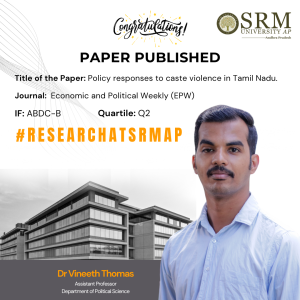 Dr Vineeth Thomas, Assistant Professor in the Department of Political Science, has recently published a paper titled “Policy Responses to Caste Violence in Tamil Nadu” in the esteemed journal Economic and Political Weekly (EPW). In the paper, Dr. Thomas offers valuable insights into the crucial issue of caste violence in Tamil Nadu and examines various policy responses aimed at addressing this complex societal challenge.
Dr Vineeth Thomas, Assistant Professor in the Department of Political Science, has recently published a paper titled “Policy Responses to Caste Violence in Tamil Nadu” in the esteemed journal Economic and Political Weekly (EPW). In the paper, Dr. Thomas offers valuable insights into the crucial issue of caste violence in Tamil Nadu and examines various policy responses aimed at addressing this complex societal challenge.
Dr Thomas’s research illuminates the dynamics of caste violence and provides a comprehensive analysis of the policy measures adopted to tackle this pressing issue. His work in the EPW is expected to significantly contribute to the discourse on caste-based conflicts and policy formulation in the region. The publication of this paper not only exemplifies Dr. Vineeth Thomas’s scholarly prowess but also underscores SRM University—AP’s commitment to fostering impactful research in the realm of social and political sciences. It is anticipated that this publication will stimulate further academic dialogue and influence policy considerations in the domain of caste relations and violence in Tamil Nadu.
Abstract of the Research
This study examines the policy response to caste violence in schools in Tamil Nadu, particularly through the recommendations of a committee led by retired Justice K. Chandru. The committee’s report highlights pervasive caste discrimination in schools and proposes various measures, including teacher transfers, banning caste markers, and implementing orientation programs on caste-related issues. The report also suggests the establishment of School Welfare Officers and Social Justice Student Forces, along with a robust grievance redressal mechanism. Despite opposition and criticism, these recommendations represent a significant step toward addressing caste discrimination in Tamil Nadu’s educational institutions.
Research in Layperson’s Terms
This research focuses on the problem of caste discrimination in schools in Tamil Nadu, India. Despite the state’s reputation for promoting social justice, caste-based violence still occurs, even among students. A committee led by retired Justice K. Chandru made several recommendations to address this issue, such as banning caste markers like wristbands and educating students and teachers about discrimination. The report also suggests having specific officers to ensure these measures are followed. While these recommendations aim to create a fairer school environment, their success depends on proper implementation and support from the community.
Practical Implementation and the Social Implications Associated
Implementing this research can lead to more inclusive and equitable school environments by eliminating caste-based discrimination. By enforcing bans on caste markers, educating students and teachers, and establishing grievance mechanisms, schools can foster a culture of equality, reducing social tensions and promoting a just society for future generations.
Collaborations
Electoral Politics
Future Research Plans
Indian govt and politics
- Published in Departmental News, News, Political Science News, Research News
From Views to Votes: Faculty Duo Unveils Political Activism on YouTube
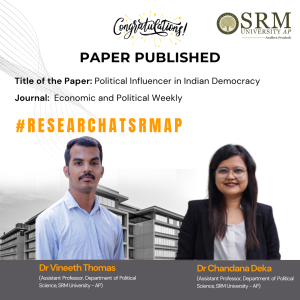 In a significant contribution to the field of politics, Dr Vineeth Thomas and Dr Chandana Deka, Assistant Professors in the Department of Political Science, have published an insightful paper titled “Political Influencer in Indian Democracy” in the esteemed Journal Economic and Political Weekly. Their work delves into the burgeoning role of YouTube as a platform for political engagement, highlighting a shift in the digital landscape where entertainment and politics intersect.
In a significant contribution to the field of politics, Dr Vineeth Thomas and Dr Chandana Deka, Assistant Professors in the Department of Political Science, have published an insightful paper titled “Political Influencer in Indian Democracy” in the esteemed Journal Economic and Political Weekly. Their work delves into the burgeoning role of YouTube as a platform for political engagement, highlighting a shift in the digital landscape where entertainment and politics intersect.
The paper explores the emergence of a new breed of political influencers who are leveraging the power of social media activism to shape public discourse. This pioneering study offers a fresh perspective on the dynamics of political communication in the age of digital media.
Abstract
In the YouTube landscape dominated by entertainment, Dhruv Rathee emerges as a prominent voice in political discourse and social media activism. His casual demeanour belies his impactful mission to mobilise Indians against perceived authoritarianism under the Modi government. Rathee’s journey began in 2016, focusing initially on educational content before delving into political commentary. His videos, known for their thorough research and straightforward presentation, address issues like governance, free speech, and electoral fraud. Despite criticisms of superficiality in his economic analyses, Rathee’s engaging style and significant social media influence highlight the transformative power of digital platforms in shaping public discourse. While YouTube journalism thrives on engagement and immediacy, traditional media’s depth and editorial rigor ensure its continued relevance in the media ecosystem.
Explanation of the Research in Layperson’s terms
Dhruv Rathee, a prominent YouTuber, has made a significant impact in the realm of political discourse and social media activism in India. Starting his journey around 2016, Rathee transitioned from creating educational content to addressing political issues, driven by his dissatisfaction with Prime Minister Narendra Modi’s administration. His videos are characterized by meticulous research and straightforward presentation, covering a wide range of topics such as governance, free speech, electoral fraud, and media bias. Rathee’s engaging style, which blends factual rigor with a conversational tone, has enabled him to connect with a broad audience, making complex political issues accessible to the layperson.
Despite criticisms of his sometimes superficial understanding of economic issues, Rathee’s ability to mobilise large audiences and his significant social media presence underscore the transformative potential of digital platforms in shaping public discourse. However, YouTube journalism, which often centers around individual personalities, can lack the depth and breadth of traditional journalism, emphasizing engagement and immediacy over comprehensive coverage.
In Traditional media, with its extensive resources, editorial rigor, and established trust, continues to play a vital role in the media landscape. Although mainstream media has faced criticism for spreading misinformation and manipulating public discourse, its structured approach to news remains indispensable. Both YouTube and traditional media have their strengths and limitations, highlighting the need for a balanced approach to news consumption from multiple sources to ensure a well-rounded understanding of current events.
Practical Implementation or the Social Implications Associated
The practical implementation of this research emphasises the necessity for a balanced approach to news consumption, combining insights from both YouTube influencers and traditional media to foster informed public discourse and preserve democratic values.
Collaborations
Electoral Politics
Future Research Plans
Indian govt and politics
- Published in Departmental News, News, Political Science News, Research News
BA (Hons.) Political Science: Your Gateway to Careers Beyond the Classroom
- Published in Admissions, Blog, Political Science News


